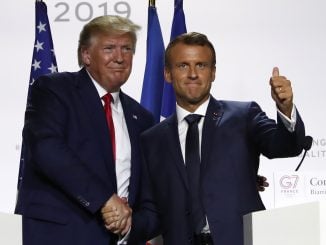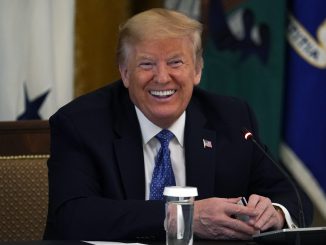WASHINGTON, D.C. — President Joe Biden used his first address before a global audience Friday to declare that “America is back, the transatlantic alliance is back,” after four years of former President Donald Trump’s “America First” lens.
Speaking to the annual Munich Security Conference virtually, Biden ticked through a daunting to-do list — salvaging the Iran nuclear deal, meeting economic and security challenges posed by China and Russia and repairing the damage caused by the coronavirus pandemic — that he said would require close cooperation between the U.S. and its Western allies.
Without mentioning Trump’s name once, Biden mixed talk of a reinvigorated democratic alliance with a rebuke of his predecessor’s approach, a message warmly received by Western allies.
‘I know the past few years have strained and tested the transatlantic relationship,” Biden said. “The United States is determined to reengage with Europe, to consult with you, to earn back our position of trusted leadership.”
The president also participated in a virtual meeting of the Group of Seven industrialized nations, where leaders managed to work Biden’s campaign theme into their closing joint statement, vowing to “work together to beat COVID-19 and build back better.”
“Welcome back, America,” said European Council President Charles Michel, effectively summing up the mood of the Munich conference.
But while such talk conveyed the palpable sense of relief among allies at Biden’s full-throated commitment to U.S.-Europe relations, plenty has changed over the past four years in ways creating new challenges.
China has cemented its place as a fierce economic competitor on the continent. Populism has grown through much of Europe.
German Chancellor Angela Merkel noted that some differences between the U.S. and Europe remain “complicated.” Europe sees China’s economic ambitions as less of an existential threat than the U.S. does.
Still, Merkel, who had a strained relationship with Trump, didn’t hide her preference for an American foreign policy informed by Biden’s world view.
“Things are looking a great deal better for multilateralism this year than two years ago, and that has a lot to with Joe Biden having become the president of the United States of America,” Merkel said. “His speech just now, but also his administration’s first announcements, have convinced us that this is not just talk but action.”
Allies were listening closely to what Biden had to say about a looming crisis with Iran.
Iran informed the International Atomic Energy Agency this week that it would suspend voluntary implementation next week of a provision in the 2015 deal that allowed U.N. nuclear monitors to conduct inspections of undeclared sites in Iran at short notice unless the U.S. rolled back sanctions by Feb. 23.
“We must now make sure that a problem doesn’t arise of who takes the first step,” Merkel told reporters. “If everyone is convinced that we should give this agreement a chance again, then ways should be found to get this agreement moving again.”



